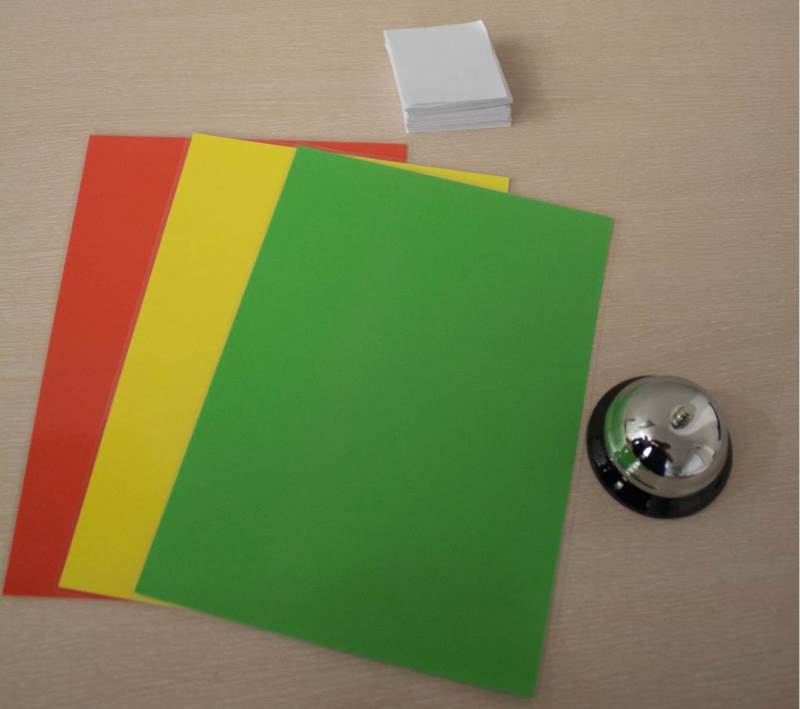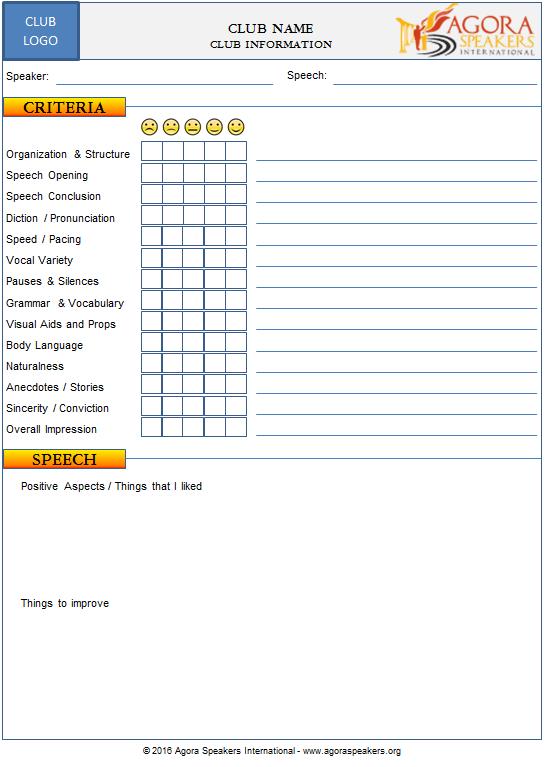***English text below. Remove this message when translating, otherwise the page may be overwritten:***
This is a tried-and-true meeting format that can be used as a starting point for your own meeting design.
This is just a suggestion of how roles could be ordered. If you're new to running an Agora club, we suggest you start with this format until you become experienced with it.
In this section, only the general ordering and suggested timings are explained, but no details are given about how each of the roles works. This information can be obtained in the "Club Meeting Roles" chapter.
The meeting format is essentially the same regardless of whether the meeting is physical or online.
Before the Meeting
The Meeting Facilitator should arrive well in advance of the scheduled starting time of the meeting. He or she should:
- Prepare the venue - tables, chairs, lectern, location of club and Agora symbols, etc.
- Prepare the tools that the Timer will use to measure and signal the time (stopwatch, "traffic" lights colored cardboard, etc.)
- Print the agenda
- If applicable, check that the lighting, sound system, and projection equipment work properly.
- If the club has recording equipment, set it up and prepare it for recording.
For Online meetings, the Meeting Facilitator should launch the meeting at least 15 minutes before the official starting time.
Some clubs enjoy a free-format "socializing" section, which usually can take up to 30 minutes before the meeting and many hours after it.
Physical Meetings
For a physical club meeting, you will need the following minimum materials:

- A stopwatch for timing speeches
- Some way to signal time limits to the speaker. This is done via green, yellow and red indicators. You can use lights or simply colored pieces of paper.
- Feedback forms for the audience. All members from the audience (even guests) can give their evaluation to every speaker on these feedback forms. You can get customizable templates for feedback forms - such as the one below - from the Branding portal (www.agoraspeakers.org/brand.jsp).
You can use the provided template, or you can create your own.

- Pens for the audience and (especially) for the Timer and the Grammarian
- Printed agendas for the meeting
- The Word of the Day, printed on one or two sheets of paper, in big letters, so that it can be seen by the speakers and by the audience at a distance.
- Sheets of paper (or preferably, templates) for the Grammarian, Timer, and Filler Word Counter.
Online Meeting
For Online Meeting, it's good to have at hand the following links and materials, in case their corresponding roles have forgotten to
- Links to the Zoom Backgrounds that the Timer can use
- Links to the Asset Creator so that the Grammarian and the Timer can generate their templates and backgrounds
- Pre-generated PDF versions of the Evaluation Sheets for each project and role. (These can be generated automatically from the page for each role and project)
- A pre-generated PDF for the General Feedback Form that members who are not evaluators can use to provide feedback to speakers
Meeting
Part I - Initiation
1. Usually, the Meeting Facilitator calls to order and opens the meeting, welcomes everyone, then provides a concise introduction to the person in the meeting leader's role for the day and gives the floor to him.
2. The Meeting Leader welcomes everyone. Some good things that a Meeting Leader can do at this point are:
- Reminding everyone to turn off their mobile phones. For Online meetings, apart from this, ask that people turn off any possible sources of interference and close the door of the room they're in.
- Reminding everyone not to walk across the room during the speeches.
- For Online meetings, remind everyone that safety and decorum must be present at all times. This means that no one should be driving or doing other dangerous activities during the meeting. Everyone should be dressed properly, and finally, everyone should have their cameras on at all times.
- If there are any guests, providing a general introduction about Agora Speakers International and the club, its purpose, mission and what we do, and in which way.
One aspect that Is always worth explaining to guests is that the meeting is not a free-form everyone-speaks meeting but follows a structured agenda, with people performing specific roles for which they have volunteered previously. This helps guests quickly clear out common misconceptions about Agora meetings
- The meeting is divided into different sections, with different people in charge of each section.
- The roles and sections have specific goals, which are explained in detail in the online materials.
- The roles are voluntary, and anyone can sign up for a role
- The roles change with every meeting - the meeting leader today is one person, next meeting will be someone else
- Everyone is evaluated so that everyone can improve and learn.
Sometimes it's also worth expressly pointing out these aspects during the introduction.
- If there are any guests, this is also a good opportunity to have each of them stand up and introduce themselves to the audience. Usually, the Meeting Leader can also ask a simple question like "how do you know us?" or "what brought you here?", etc.
Some guests confuse the invitation to introduce themselves with an invitation to deliver a 20-minute speech on the spot. The Meeting Leader should be quick to interrupt any such stray speeches that might derail the whole meeting.
Part II - The Evaluation Team
3. The Meeting Leader gives the floor to the Timer for 1-2 min, who explains his role, why timing is important, and how the time signals work
4. The Meeting Leader gives the floor to the Grammarian for 1-2 min, who explains his role and the things he is going to look for.
5. The Meeting Leader gives the floor to the Filler Word Counter for 1-2 min, who explains his role, the importance of not using filler words, and some examples of them.
In some meetings, the Grammarian and the Filler Word Counter roles are performed by the same person. Also, one of them can introduce the "Word of The Day". The Word of the Day's goal is to train people in being flexible when they speak and adapt to changes instead of learning speeches by heart.
Part III- Projects
6. For each Project, the Meeting leader:
- Calls upon the Speech Evaluator to explain the objectives of the speech
- Calls upon the Speaker to deliver the speech
- Gives the audience between 1-2 minutes so that everyone can write their feedback to the speaker.
It is recommended that projects be ordered in increasing order of difficulty to avoid having a solid performer come before an inexperienced speaker.
7. After the prepared speeches part is over, the Meeting Leader gives the floor to the Hot Questions Master, who proceeds with this section. Usually, this section is about 15 minutes long, with each answer to Hot Question being between 1-2 minutes long.
This is a good moment for a short break if the club has this tradition, as it gives more time for evaluators to finish their evaluations. Also, some clubs like to vote for the best speaker and best hot questions answer. This would also be a good time to ask for everyone to vote and collect their votes. If there is a voting session, you should repeat (and preferably write down in a visible place) the speakers' names and the names of all the participants in the Hot Questions part.
Part IV - Speech Evaluations
8. After the previous section is done, the Meeting Evaluator calls the Speech Evaluators to deliver their evaluations, each evaluation being 3-5 minutes long.
9. After all the Speech Evaluations are delivered, the Hot Questions Evaluator takes the stage and presents his report. This evaluation is about 5-7 minutes long
10. Optional. If your club has a Listening Evaluator, now it would be a good opportunity for that role.
Part V - Technical Evaluations and Conclusion
11. After the previous part is finished, the Filler Word Counter, Grammarian, and Timer present their reports, for 1-2 minutes each, usually in reverse order in which they participated at the beginning of the meeting
12. Finally, the Meeting Evaluator presents his overall evaluation of the meeting and all the evaluators. This part usually lasts for 5-7 minutes
13. The Meeting Leader gives the floor to anyone (especially club officers) that needs to make announcements.
This is a good point for the Meeting Leader to ask guests about their opinions on the meeting, how they felt, etc.
14. The Meeting Leader gives the floor to the Meeting Facilitator, who closes the meeting.